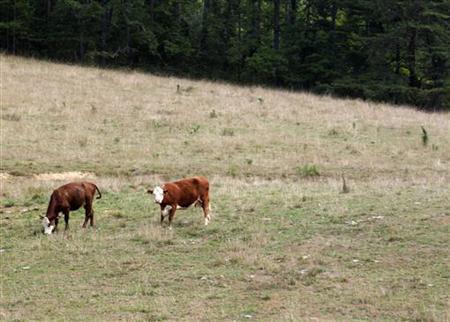Drought bill offers livestock farmers up to $100,000 each
Date: 02-Aug-12
Country: USA
Author: Charles Abbott

Cows feed in a drought-damaged pasture as temperatures climb over
100 degrees Fahrenheit (38 degrees Celsius) in Jasper, Indiana, July
24, 2012.
Photo: John Sommers II
Livestock producers hit by the worst drought in half a century could get up to $100,000 each to offset high feed costs and death of animals under a bill expected to pass the House of Representatives as early as Thursday.
Republican leaders indicated they would fast-track a vote on the $383 million bill before Congress leaves on Friday for a five-week vacation. There would be little time left for the Senate to act, so it could be fall before the plan becomes law.
While crop insurance will provide a safety net for many farmers, disaster programs for livestock producers expired at the end of 2011. Lawmakers were under pressure to provide help before they recess until Sept 10.
The bill would compensate ranchers for 75 percent of the value of stock killed by drought and pay 60 percent of feed costs for one to three months for stock on the range. It also has $20 million for feed and water shortages for livestock, bees and farm-raised fish, and a program to help tree farmers recover from losses.
Two farm lobbyists said the bill was likely to pass. Lawmakers feel pressure to help farmers survive the drought.
Two-thirds of the continental United States is under moderate to exceptional drought, the worst drought since 1956. The Agriculture Department declared an additional 218 counties from Georgia to Arkansas and Wyoming as disaster areas, making farmers eligible for low-interest emergency loans. Half of all U.S. counties are disaster areas, most due to drought.
House Republican leaders planned to call a vote on the drought bill under a format that limits debate to one hour and bars amendments but requires a two-thirds vote for passage.
Conservation, sportsman and environmental groups said it was unfair to pay for disaster aid by cutting soil and water conservation programs, so they called for defeat of the bill.
A dozen main-line farm groups said "we do not oppose passage of a disaster assistance bill" but it would be better for Congress to pass a full-bore farm bill. They said the disaster bill cuts conservation by $639 million, to provide $383 million in and to devote $256 million to reducing the federal deficit -- an unfairly large cut in their eyes.
If Congress enacts disaster aid, months could pass before USDA would begin issuing payments. The House bill allows three months to write the rules for assistance, a fairly quick timetable, with additional time needed to decide who is eligible and to assess the size of payments.
(Reporting By Charles Abbott)
![]()
© Thomson Reuters 2012 All rights reserved